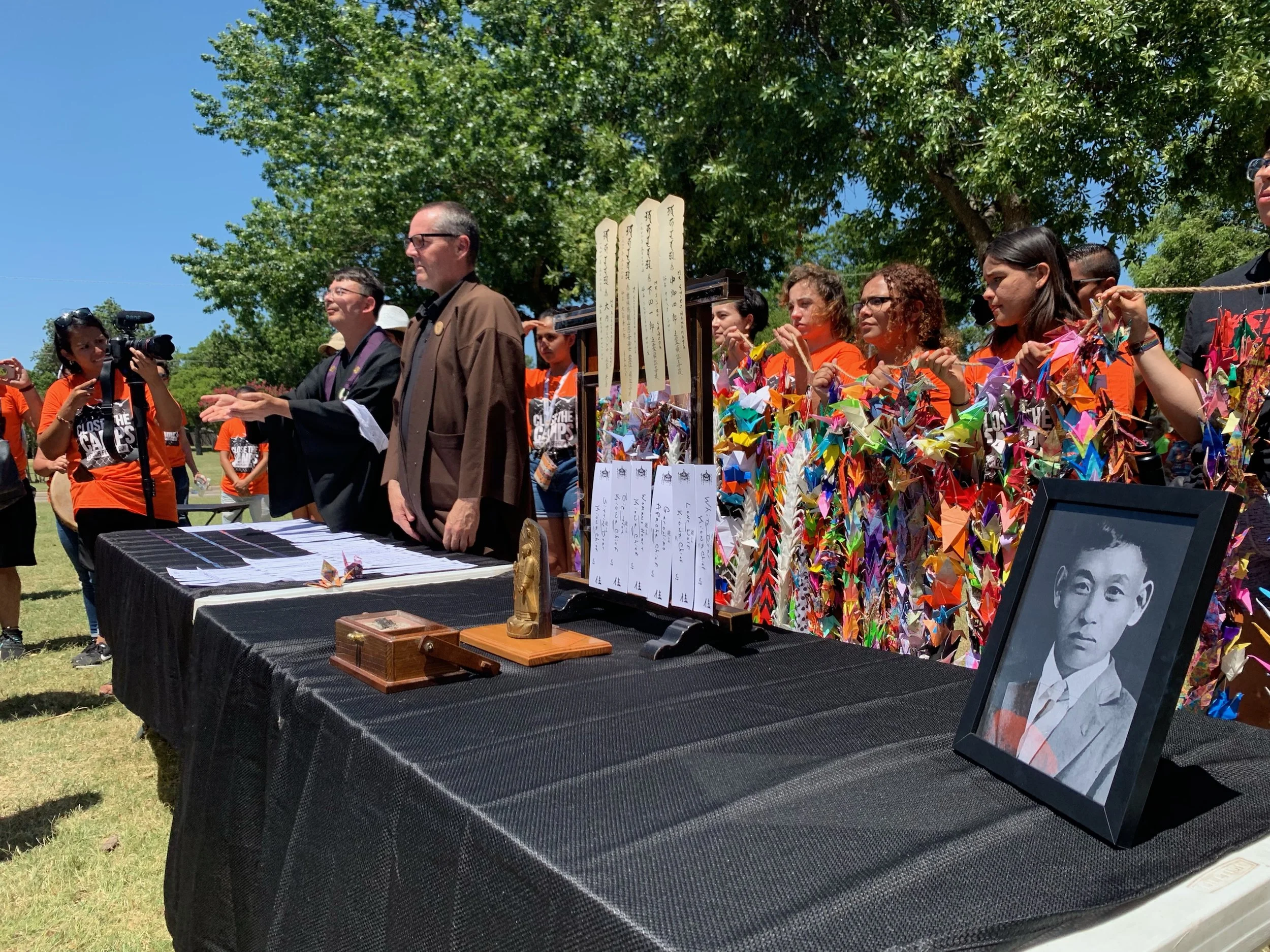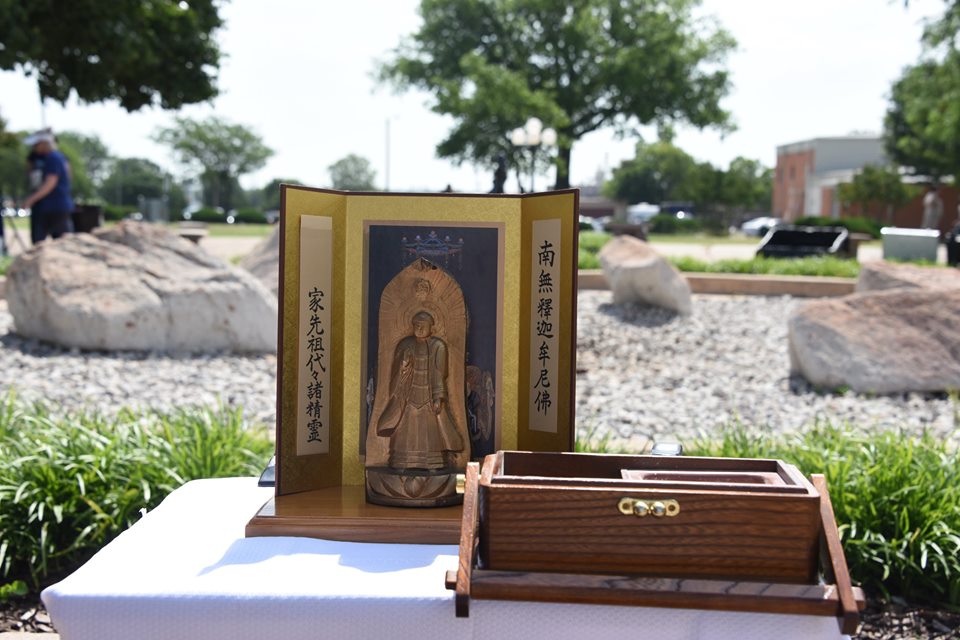The Six WWII Japanese American Camp Survivors about to Make Their Statements at Fort Sill (Molly Hennessy-Fisk/LA Times)
A Letter Asking Buddhist Leaders to Support Tsuru for Solidarity
UPDATE: Read the updated letter here. →
Tsuru for Solidarity, a nonviolent and direct action project, was initially created by Japanese American community leaders Satsuki Ina, Nancy Ukai, and Mike Ishii in conjunction with the March 2019 Pilgrimage to Crystal City, a former WWII internment camp in Texas that housed over 2,000 persons of Japanese ancestry, and Protest at the South Texas Family Residential Center (located 40 miles away in Dilley, Texas).
The Dilley facility holds over a thousand asylum seekers, mostly women, children, and infants from Central America and Mexico. Here, the women and children try to sleep on concrete floors while being deliberately prodded by Border Patrol agents all day and night, try to live on two bologna sandwiches for four days whilst denied bathroom visits. These examples of harassment by the Border Patrol are attempts to persuade the refugees to turn back before they have a chance to have an interview with an asylum officer. We have also read inspection reports of numerous facilities – such as the ones in El Paso and Clint, Texas – where children have been denied showers, soap, or toothpaste whilst trying to take care of the younger infants. Administration officials have asserted that basic human hygiene does not have to be afforded these children, while border agents tell these migrants that if they want to drink water, they need to get that from their cell’s toilets; again, to enact our nation’s “tough” deterrence immigration policies favored by some.
Fort Sill (Oklahoma) – WWII Japanese American Internment Camp and 2019 Detention Facility for Migrant Children
When the Department of Health and Human Services announced on June 11 that up to 1,400 unaccompanied migrant children would be transferred from Texas to Fort Sill, Oklahoma – a former WWII internment camp that held 700 persons of Japanese ancestry, including 90 Buddhist priests – I was heartened to hear that Tsuru for Solidarity was planning to mobilize a second protest on June 24 in Oklahoma. I decided to join this protest as the treatment of these children is not a partisan political issue – we should recall that a previous Democratic administration similarly used Fort Sill to house unaccompanied migrant children back in 2014 – but a question of basic human decency and our nation’s values and character; it was wrong then and it is wrong now.
I had the privilege of joining a group of 25 protestors, including six WWII Japanese American camp survivors, who traveled to Fort Sill to declare that “Never Again is Now.” Despite threats from the military police at the Fort Sill gate, the six camp survivors – all of whom were children during their wartime incarceration – made moving statements from their personal experience (see Democracy Now! coverage). A protest rally then was held in a nearby park with roughly 200 Oklahoma residents, representing a diverse cross-section of protestors: immigrant rights advocates such as Dream Action Oklahoma, ACLU Oklahoma, Black Lives Matter, and the American Indian Movement (see the LA Times’ coverage). It was an honor to officiate a Buddhist ceremony at the start of the rally – chanting the Heart Sutra while the six camp survivors offered incense in front a Buddha statue that had been carved in Manzanar in 1943, which I had borrowed from LA’s Zenshuji Temple. This ceremony was part of a healing ceremony led by Michael Topaum, the spiritual leader of the American Indian Movement, which was apropos to the fact that Fort Sill was a prisoner-of-war camp for Apache tribal members and that the U.S. has a history of forcefully removing their children from their homes and into so-called “Indian Schools.”
My Dharma message at the protest was “How do paper cranes fly?” The small group of protestors were in fact joined in spirit by the thousands who had folded the origami cranes. But what can paper cranes do to alleviate the suffering enduring by so many?One of the classic Buddhist symbols of liberation is likened to a bird soaring freely in the sky. We say that for the bird to fly, it needs both wings: the wing of wisdom and the wing of compassion. What I witnessed at Fort Sill was the embodiment of all the elements necessary to make paper cranes fly. The enormity of our current challenge may seem overwhelming, but Buddhist practice does not shy away from challenges – our bodhisattva vows include “Sentient beings are numberless; I vow to save them all. Desires are inexhaustible; I vow to put an end to them. The dharmas are boundless; I vow to master them. The Buddha’s Way is unsurpassable; I vow to attain it.”
Buddhist Memorial Service at Next Protest at Fort Sill [July 20, 2019]
Dream Action Oklahoma (affiliated with United We Dream, the nation’s largest immigration youth-led network) is organizing a coalition of groups in Oklahoma for another large protest at Fort Sill on Saturday, July 20 and Tsuru for Solidarity has been invited to participate. I have been asked to coordinate a Buddhist memorial service at this upcoming rally. Back on May 13, 1942, nearly 90 Buddhist priests, under the watchful eye of the guards pointing machine guns on them, officiated a joint funeral service for three Japanese men who died at Fort Sill. One of them, Kanesaburo Oshima, was shot in the back of the head by one of the guards the day before the funeral. One internee wrote, “Nothing is more transient than human life. . . Smoke from the burning incense stung our eyes. ... the pitiful death of a fellow countryman whose life was shattered when his blood stained the distant desert sands of the Oklahoma plain as the glowing evening sun sank beyond the horizon.”
While it is unlikely that we can assemble such a large group of Buddhist priests to fly out to Oklahoma on July 20 to honor our ancestors, I would like to appeal to Buddhist leaders of all lineages to support this memorial service. We will dedicate any merit derived from the chanting of sutras at the service to the three men who passed away during their WWII incarceration; to all those who suffered at Fort Sill in the past; to the seven children who have died in the custody of the U.S. Border Patrol in the past year; to all the migrants who are facing such difficult circumstances currently; and to the guards and others who are overseeing the children to pray for the prevention of history repeating itself.
How Can Buddhists Get Involved?
Since the protest at Fort Sill, I’ve received numerous communications asking, “How can we help?” “Are there ways in which Buddhists can show support for those who are being detained or participate in non-violent protest?” I would like to propose three possible ways to show your concern and support.
1) ATTEND – if your time and resources permit, please join us at Fort Sill on July 20. Let me know if you or a representative from your Sangha can make the trip to Oklahoma by emailing me at Duncan@duncanryukenwilliams.com Your name will be added to the Sangha Support Group.
2) FOLD A PAPER CRANE – your spirit will be present at Fort Sill and other locations wherever Tsuru for Solidarity takes the origami paper cranes, including a major future protest at the White House in Washington DC. Please send your cranes to Duncan Ryuken Williams, c/o Ito Center, 825 Bloom Walk, ACB 130D, Los Angeles, CA 90089-1481. Your name will be added to the Sangha Support Group if you email me about your paper crane folding project.
3) DONATE – please support this memorial service and other future actions of Tsuru for Solidarity by making a donation of any amount to this inspirational Japanese American initiative at their GoFundMe site. Your name will be added to the Sangha Support Group if you email me about your financial support.
In the Dharma,
Duncan Ryuken Williams
Soto Zen Buddhist Priest, USC Professor, and author of American Sutra







